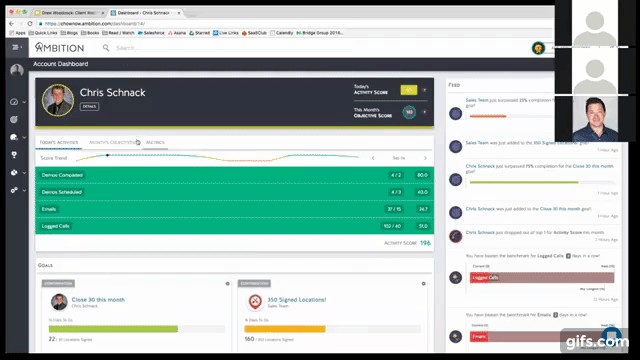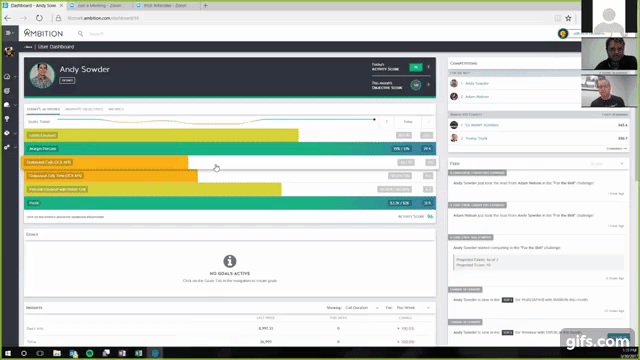Tired of CRM headaches? As a sales leader myself, I can empathize.
Customer relationship management software is - like many core business technologies - a necessary part of your business. And it's up to you (and if you're lucky, you're sales ops lead) to ensure its success. To help, I've laid out four principles that helped us grow revenue 386% in 2016 here at Ambition in 2016.
#1. Identify your 1-2 biggest pain points
At its core, your CRM should serve two core business values: 1. It should help you obtain more business by organizing and tracking pipelines. 2. It should give you key data insights about your sales process, rep performance, revenue forecasts and so forth.

Where things get tricky with CRM optimization is - most CRMs have great functionality, but are terribly disengaging to the user. I think this is where interface, functionality and price come into play - you should find the CRM that matches your organization on those terms, and determine whether you plan on having committed sales operations personnel in the near-term.
#2. Ask reps what they’re struggling with most.
The sticker price for a CRM is rarely its true price. Accounting for cost of onboarding, training programs, and additional software, investing in a CRM is very much like buying a house. You're putting a roof over your family's head and making a long-term investment that will accrue many, many unforseen costs (repairs, etc) that end up being unavoidable.
At the very outset, CRM adoption always carries the additional cost of user onboarding, adoption, training, etc. That’s time your reps could be selling, but instead, they’re working with this technology.
From there, you inevitably find yourself buying sales automation, gamification and other add-ons to get more value out of the initial software. The key word there is inevitable. Your CRM, after all, is mostly just a data warehouse. It can do some nifty things with that data, but having one in and of itself isn't going to make your team smarter, faster, or more efficient. It's those follow-up investments that will.

Workflow efficiency, data transparency, and process analytics are all things every sales organization should be investing in - no matter the size.
Think of it this way: What's a better investment for your 100 person sales team - spending $65k annually on a product like Ambition that visualizes your entire team's key performance metrics, tracks their goals, recognizes success, and brings context and clarity to your CRM data? Or another new sales hire?
#3. Factor in each CRM’s integration options.
As your sales organization starts to scale, you’re inevitably going to be bringing on things like marketing automation, a phone system, business intelligence and sales performance management tools - if you don’t already have those things.
The more seamlessly integrated your CRM is with all those, the better. It will save you a ton of headaches down the road. You wouldn’t believe how many logistics companies use Ambition just to connect their CRM with other data sources like Cisco, MacLeod and so forth.

We are about to write our first Hubspot CRM API integration for one of our oldest clients in that industry. Why'd they switch? The direct integration between Hubspot CRM and Hubspot's sales and marketing automation platforms.
#4. Know when it's time to switch.
Should you decide to switch your CRM software, be sure to do extensive research to find the best CRM software for your business, one that your sales reps will actually use. Look to online resources like CRM buying guides, third party review sites and online discussion boards like Quora to help inform your decision.
User interest and aptitude are crucial to CRM sucess. If your users take to the CRM like ducks to water, that’s a huge sign. If there’s a ton of blowback and the sense that you’ll be fighting to drive adoption rates, tread carefully.
I would you suggest involving salespeople in the final decision. The CRM is as much their system as it is yours. They’re going to be living in it every day - and if that’s not an enjoyable experience for them, then neither of you are going to get the value you want out of it.
Get the 2017 B2B Trends and Tech Guide
Want more ways to optimize your sales and marketing technology stack? Get the 2017 Trends and Tech Guide for B2B Sales and Marketing - free to download at b2btrendsandtech.com and chock full of original analysis and full profiles of 112 unique software solutions to help you meet your business needs this year.
To learn how Prezi, Ambition, and LeadGenius can help your B2B sales team hit its 2017 revenue goals, please contact us.

 Back
Back



